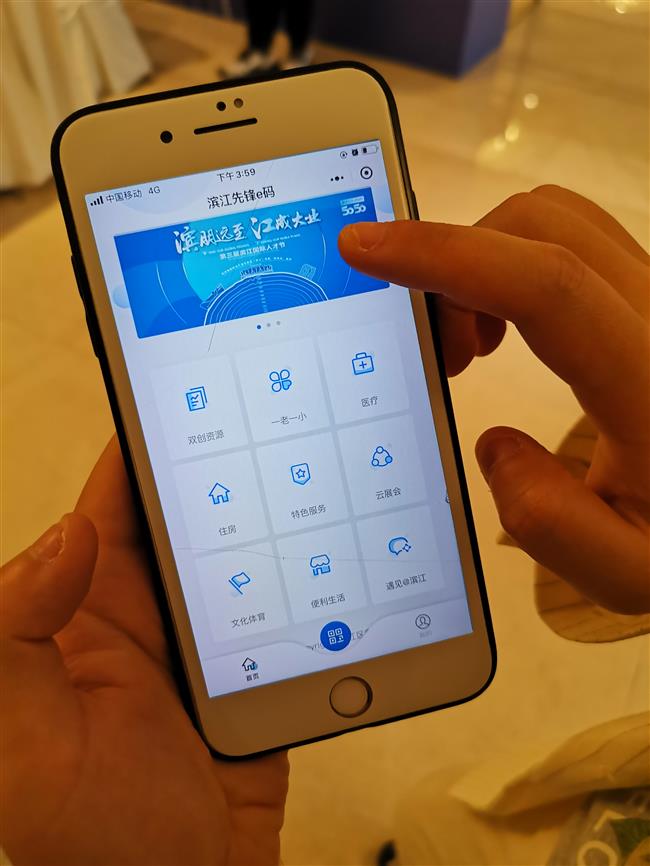New platform makes Binjiang life even easier

A ceremony is held to celebrate the 10th anniversary of Binjiang 5050 Talent Plan in Hangzhou on May 5. The plan, including subsidies of up to 10 million yuan for promising projects and various incentives for talent, has made the district a leading labor market and innovation center.
Hangzhou’s Binjiang District celebrated the 10th anniversary of its 5050 Talent Plan on May 5.
The plan, which includes subsidies of up to 10 million yuan (US$1.41 million) for promising projects and various incentives for talent, has made the district a leading labor market and innovation center in Hangzhou.
Now, the district government believes it can sweeten the deal through a new platform, Binjiang E Code, which is designed to bring government departments and skilled workers closer together through a channel linking them directly.
At the celebration ceremony, the new platform officially became available to thousands of skilled government-authorized workers in Binjiang District.
Qualified users can apply online for subsidies, financial aid and public welfare to help them cut down visits to official service windows and share resources.
For instance, applicants previously had to submit a number of documents at service windows when applying for a talent apartment. Now, they are only required to log in on the platform and fill in information online.
The information will be pooled into a big data system where it can be shared among government departments.
On the new platform, the government is offering some 4,500 apartments which are available to view and select online.

Binjiang E Code is designed to bring government departments and skilled workers closer together through a channel linking them directly. Qualified users can apply online for subsidies, financial aid and public welfare to help them cut down visits to official service windows and share resource.
Zang Weiqing, who leads the research and development team at Ustar Co Ltd, is one of the government subsidy recipients. After working in the US for several years, she returned to start her career in Binjiang four years ago.
Her team has developed a point-of-care testing kit for COVID-19 which can cut the time for diagnostic testing to 30 minutes. Doctors can sample blood, saliva or excrement from a patient and then put it into a portable testing machine. Testing accuracy has been refined to nearly 100 percent. Their products are now exported to Singapore, Malaysia, Thailand and Brazil.
“I live in a talent apartment, and the government subsidizes one-third of my rent,” Zang told Shanghai Daily. “That helps cut down my living costs in Hangzhou.”
For years, local authorities have implemented preferential policies on rent, child education, medical insurance and financial subsidies to attract top talent. Now, benefit applications and services are all available on the platform.
To relieve parents’ burdens on education, the platform even offers one-on-one tutoring services. Parents can upload homework, and then outstanding teachers will tutor their children online.
The Baima Lake Primary School, which is considered one of the best schools in Binjiang, is now accessible to the children of those professionals. They can apply to send their children to the school by logging on the platform.
Binjiang government also cooperates with the Second Affiliated Hospital of Zhejiang University to provide local staff with medical services. They can make appointments at the hospital on the platform and have priority in selecting prestigious doctors.
“This is an upgrade to our one-time-visit service,” said Jin Qiu, developer of Binjiang E Code.
A few years ago, Zhejiang Province started to optimize its official working process to solve individuals’ and companies’ problems to encourage innovation and streamline services by cutting red tape.
Meanwhile, individuals and companies can share their products, personal resumes and ideas on the platform to search for potential cooperation and expand sales channels.
When users log in on the platform for the first time, they can choose tags based on their interests, and the big data will suggest a particular social circle for them.
“That function can efficiently integrate resources in the district. Effective online social activities can help them discover new opportunities and build business partnerships,” said Jin.
Today, Binjiang District is already an attractive area with plenty of high-tech companies and a favorable business environment.
By virtue of the 5050 Talent Plan, the district government has attracted around 20,000 industrial professionals, engineers and top-notch talent, including 37 Noble Prize and Turing Award winners. About 780 companies, including 12 listed firms, have been established by these people.
According to the government’s blueprint, by 2035, the district is hoped to become one of the world’s top high-tech areas and can compete with counterparts in other cities, like Zhangjiang High-Tech Park in Shanghai and Zhongguancun Science and Technology Park in Beijing.
“Talent is the key to make the goal come true,” said Jin.
















